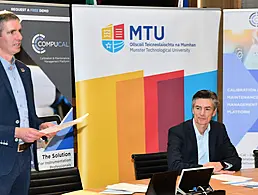It would be assumed that as head of the Higher Education Authority’s (HEA) ICT skills project team, Pat O’Connor (pictured) would be inundated with funding to help Ireland move up the value chain. But this seems not to be the case.
One of the recommendations of the third report of the Expert Group on Future Skills Needs (2001) was that a five-year budget of €165m be made available to fund the skills programmes and capital infrastructure needed to allow Ireland to survive and thrive in the knowledge-based era. So far, the amount of money made available has fallen far short of that. While the HEA has an annual skills budget of €32m, only about €3m of that goes directly into providing the skills needed in the ICT area.
O’Connor is diplomatic about the underfunding. “When I took up this job, my expectation was that this money would flow but a number of things changed in the meantime. We had a slump in the industry, hiring levels were not as high and, therefore, the Government’s commitment to skills along with a number of other areas disappeared. It’s starting to rise up the priority list again but I doubt that we’re ever again going to see the type of budget that was in that report.”
The lower-than-anticipated funding has obviously curtailed certain skills projects but O’Connor believes that, despite this, much has been achieved. The initiatives can be categorised into four main areas. The first of these is new postgraduate courses, 15 of which have been established with the help of HEA funding in third-level colleges right across the country. The majority of them oversubscribed, the courses cover a broad range of topics, from bioinformatics to security and cryptography as well as general computer science. Approximately 250 students attend these every year. The strong level of uptake is, he feels, a sign that both students and employers are seeing merit in postgraduate qualifications.
“The people working in industry are very conscious of the need to upgrade their skills and are willing to pay in order to do so with their employers willing to support them in many cases,” he says.
The increase in employees with postgraduate qualifications is, he notes, currently one of the strongest trends in the ICT industry. Instead of hiring graduates with five year’s experience, big IT firms prefer to recruit those with masters or PhDs. And, whereas a few years ago, science and technology graduates saw no great benefit career wise in engaging in further study, they do now. In fact, the HEA recently published figures showing that of graduates who were awarded a primary degree or equivalent in 2003, 46pc were not in employment nine months later and the majority of them were adding further letters to their resume.
Part-time courses are the second area of activity. These have been found to be most suited to the institutes of technology. These have had traditionally strong links with community education programmes and so can offer someone with, for example, a Further Education and Training Awards Council qualification the opportunity to move on to the next level of study. Overall however, by O’Connor’s own admission, part-time courses have not enjoyed the same level of uptake as postgraduate.
Putting programmes in place to improve course completion rates has been the third area of focus. More than €3m has been allocated to non-completion measures to date in 22 institutions, with a further €1.5m proposed for this year. The issue of completion is seen as more important than ever given the falling course attendance numbers in the science and technology area in the recent past. A problem area for many years, it has begun to show signs of improvement thanks to the targeted programmes that have been put in place.
“The actions are starting to have an effect. It is now accepted by every institution — something I would not have believed a few years ago — that by providing additional support and additional resources you can address the problem,” says O’Connor.
Last November a number of third-level institutes came together to discuss the issue and share experiences. They demonstrated how they were able to improve completion rates through a number of mechanisms from a programming support centre (Trinity College Dublin) to problem-based learning (Blanchardstown Institute of Technology).
One of the factors fuelling the poor completion rates has been low class attendance levels. This is partly attributable to the part-time job culture that has become deeply rooted on campus. To pursue this idea, the HEA is funding an electrical engineering course at Tallaght Institute of Technology that incorporates some fresh thinking. For example, any lecture will be available twice a week and generally in the afternoons and most of the practical work can be done online. The course is due to begin in the autumn.
The last area that the HEA skills team is addressing is in some ways the most challenging: the falling participation rates of women on ICT courses. In 2001, women accounted for 32pc of enrolments. The figure has declined to 16pc today against a background where overall enrolments on ICT courses have plummeted by 50pc. As well as being put off by the technology downturn it seems that women are also being attracted more towards empathetic careers such as nursing and medicine.
“If we are going to attract more women back into these courses we are probably going to have to offer blended courses that combine, for example, computer science and humanities,” O’Connor observes.
While not downplaying any of the challenges that need to be addressed, O’Connor is confident that the ICT industry will get the skills it needs to grow. “We’ve achieved a state of balance. The ICT industry was a bit overhyped in the late Nineties and attracted in people who perhaps weren’t best suited to it anyway. With the recent correction, maybe we’re not attracting as many people as in the past but we’re attracting those with a genuine interest in the industry.”
By Brian Skelly




